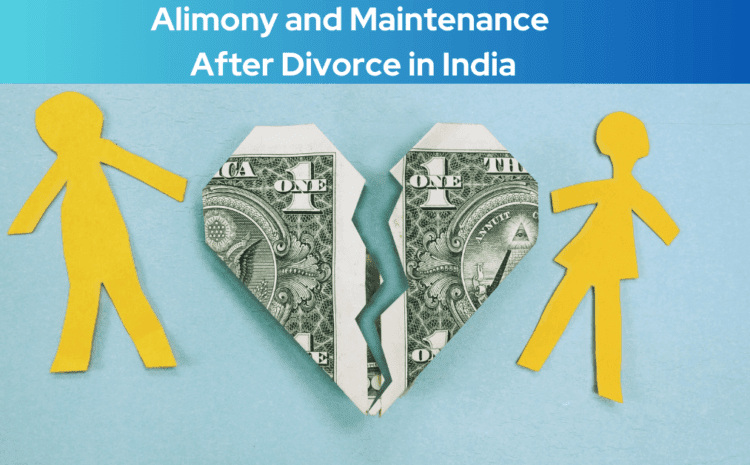
Addressing the emotional burdens of a divorce goes hand in hand with practical matters, including financial considerations that former spouses might encounter unequally after the separation. In India the law of alimony and maintenance is aimed at resolving these concerns favoring a situation where both parties are satisfied. The mastery of the intricacies of alimony and maintenance legislation is very important for anyone who undergoes divorce procedure in India. This detailed guide plunges into the inner workings of the alimony and maintenance after divorce, illuminating the related legal provisions, determinants, and practical matters pertaining to claiming and execution.
Understanding Maintenance
Spousal support, or maintenance, is a critical aspect of divorce proceedings in India, wherein the court may allocate financial assistance to ensure the basic necessities of housing, sustenance, and clothing for a spouse who lacks independent financial means. The primary objective of such maintenance arrangements is to safeguard the rights of the divorced partner who faces economic vulnerability post-separation. Notably, in contested divorces, where disputes are unresolved prior to court proceedings, the determination of maintenance becomes imperative.
Are Alimony and Maintenance same?
Alimony and maintenance are closely related, often being used to substitute one or another, but they have different underlying purposes. “Alimony” is basically the term referring to maintenance or financial support in the context of marriages. Generally, it consists of the delivery of a sum of money or property from one partner to the other, that is a one-time transaction usually when all the proceedings of the divorce have been availed but before the final order.
Unlike a spouse, maintenance can be obtained without any matrimonial relief being granted. In terms of financial matters, its range extends to the help one spouse requires from the other, types of which are interim maintenance and permanent maintenance. Interim maintenance is sought to address urgent needs while the divorce trials are still ongoing, with the permanent maintenance determined at the conclusion of the divorce meetings, which may be a monthly payment that has been prescribed by the court.
Understanding Alimony in Context of Various Indian Laws
As discussed above, it is thoroughly understood that Alimony is a legal obligation for one spouse to provide financial support to the other spouse after a divorce or separation. The purpose is to help the financially dependent spouse maintain a similar standard of living as during the marriage. Alimony payments typically begin after a divorce is finalized, and a court order has been issued. The timing may vary depending on the specific circumstances and the legal process in each jurisdiction. However, the Court also grants interim maintenance while court proceedings are underway.
The law in India does provide for alimony and maintenance in the context of divorce and marriage dissolution. The provisions for alimony and maintenance are covered under various personal laws in India, which apply to different religious communities such as:
a) Hindu Law
Under Hindu law, both the Hindu Marriage Act, 1955, and the Hindu Adoption and Maintenance Act, 1956, provide for the payment of alimony and maintenance. These laws apply to Hindus, Buddhists, Jains, and Sikhs.
Within the scope of Section 25 of the Hindu Marriage Act, permanent alimony or maintenance is mentioned. The provision states that the court has the power to compel the respondent (either the husband or the wife) to provide for the applicant’s maintenance and support for a period that does not exceed the applicant’s lifetime. To decide a fair amount, the court considers various elements, including the income and assets of both parties, their behavior, and other pertinent facts. If necessary, a charge on the respondent’s real estate could be used to ensure the payment.
b) Muslim Law
In Islamic law, there are provisions for maintenance (known as “Nafaqah”) that can be claimed by a wife from her husband during the marriage and after divorce. The Muslim Women (Protection of Rights on Divorce) Act, 1986, also provides for certain rights and maintenance for Muslim women after divorce.
The Act of Protection of Muslim Women (Divorce) Section 3 and Section 4, which were enacted in 1986 detail the alimony paid to Muslim divorced women in India. Pursuant to Sub-Section 3, a divorced Muslim woman, as per the custom, is eligible for a reasonable maintenance allowance from her long-gone husband. The maintenance is not solely amounted to the financial support, but also involves all assets or properties which were given to the woman in marriage as well as the agreed upon mahr or dower at the time of marriage.
Through the Daniel Latifi proceedings, the Indian Union government decisions on alimony matters were fixed for the Muslim women. This judgment was special as it raised the issues concerning the constitutionality of the Muslim Women (Protection of Rights on Divorce) Act in 1986 via a Public Interest Litigation (PIL). The court reaffirmed that a man remains liable for a religious divorce ritual for a woman even after she has completed an iddat period as a stipulation in the main offense in the register of the act. Furthermore the guardian provision is designed to secure minimum alimony for divorced Muslim girls from the specified relatives in the contract and to reflect upon their responsibilities of caring for the girls’ wellbeing and excellence in all walks of life. In the instance where a family member cannot fulfill this role, the appointed Wakf board will do also, as ordered by the Chief Magistrate, but with the aim of helping the woman to survive and never to lose her worth as a human being.
c) Special Marriage Act
The Special Marriage Act, 1954, applies to inter-religious and inter-caste marriages in India and provides for maintenance and alimony in case of divorce. Section 37 of the Act concerns alimony and maintenance that is paid permanently. The husband may be ordered by the court, which has jurisdiction under this Act, to provide for the wife’s maintenance and support. This can take the form of a claim placed against the assets of the husband, a one-time payment, or a series of payments that won’t last longer than the wife’s lifetime. To calculate a fair amount, the court considers a number of variables, including the wife’s assets, the husband’s assets and financial capacity, their respective conduct, and other pertinent facts.
d) Code on Criminal Procedure
Section 125 of the Code of Criminal Procedure (CrPC), 1973, gives the right to the court to take a decision to give maintenance if a person undermarkets a maintenance obligation to his wife, kids, or parents who are not capable of maintaining themselves. Although having in mind that some conditions and exceptions described in this part are present, it remains relevant to remember this fact.
In Chaturbhuj vs. Sitabhai (AIR 2008 SC 530), the Supreme Court of India reiterated how Section 125 of the Code of Criminal Procedure acts as a modality of social justice, an objective more important than other factors. The provision is specifically formulated to ensure the personhood and amenability of women and children and it is not a criminalization of the past omissions to prevent situations of vagrancy and destitution. Its main aim is to see all people with the capacity to help those who are unable to meet their needs equally with those who have a moral right to receive aid. This annotation, therefore, stresses the law’s deeper social role, highlighting the aspect of securing economic security and having self-respect for socially important people, especially for women and children.
Conclusion
In conclusion, the alimony and maintenance provisions of India should be treated as important tools which help to provide financial security for the spouse post divorce, and for the ones who are likely to face financial problems. There are a number of legal issues relating to these provisions, some concerning the actual acts and statutes which define these issues in more detail.
From permanent alimony to child support, the range of maintenance option meet a variety of situations, with considerations including but not limited to income, standard of living and the responsibility of the family. Ultimately, the extent to which these provisions are applied is conditioned differently depending on the personal laws based on the religious affiliation of the individual thus highlighting the fact that Indian legal proceedings have their own complexities.

Advocate Kiran S R – A highly skilled, passionate, dedicated advocate, with vast wealth of knowledge, professionalism, ethical approach and expert skills. One of the sharpest legal mindset brings the best principles of legal practice to the forefront. A qualified Engineer turned Advocate. His passion, dedication and vision to help and assist his clients achieve the best results is his driving force.

